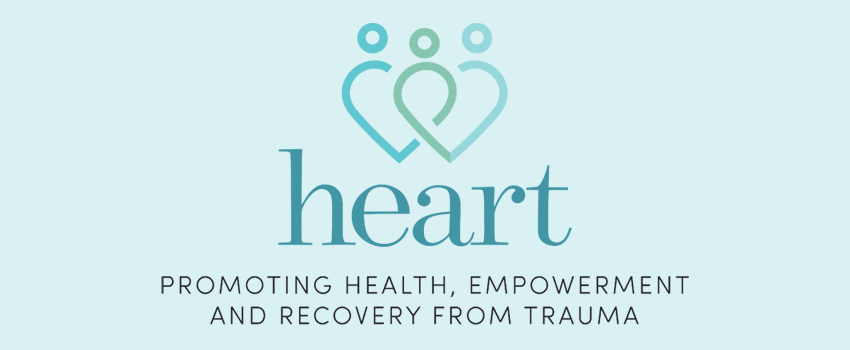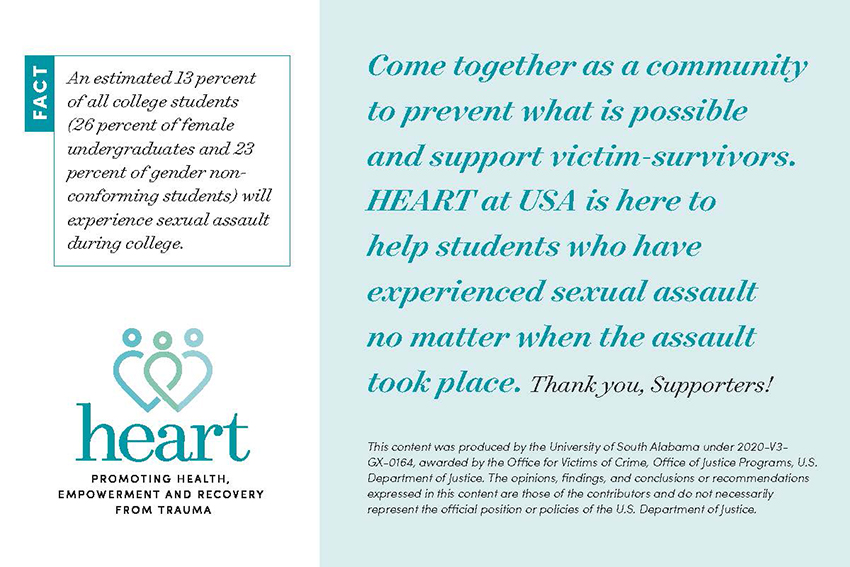HEART Vision, Mission, and Values


Vision
A violence-free campus community where victims & survivors of interpersonal trauma1 feel safe and supported in their healing journey so that they may be empowered to
live their healthiest lives.
Mission
To both prevent sexual violence2 on campus and provide holistic, trauma-informed clinical and recovery-oriented services
to South students who have experienced sexual violence2 in an inclusive, non-judgmental, and confidential environment.
Values
We believe people affected by interpersonal trauma1 deserve compassionate, culturally-responsive care that adheres to best practices
and continuously strives for excellence. In line with this guiding belief, we hold
the following values:
▼ Trauma-Informed
All of our work is guided by the fundamental principles of trauma-informed care: safety;
trustworthiness and transparency; peer support; collaboration and mutuality; empowerment,
voice, and choice; and attention to cultural, gender, and historical considerations.
HEART team members and partnering departments participate in ongoing professional
development emphasizing trauma-informed care, and policies and procedures are developed
and amended to facilitate a trauma-informed approach to all aspects of care delivery.
▼ Victim and Survivor-Centered
We trust that those with the lived experience of interpersonal trauma1 possess invaluable, inherent wisdom of the healing process and are fully capable
of making their own informed decisions regarding the best course of action for their
recovery. As such, victims and survivors who receive care from HEART guide the entire
process. Upon initiating care, the victim/survivor is offered an array of services,
including medical care, evidence collection (with the option of reporting to law enforcement),
advocacy, and counseling – which services the victim/survivor receive, if any, are
completely at their own discretion. HEART team members commit to supporting victims’
and survivors’ decisions and, when necessary, advocating on their behalf to ensure
students receive the services they choose in a timely, hassle-free manner.
▼ Confidentiality
Just as we are committed to empowering the victim/survivor to be in charge of the
care they receive from HEART, we are dedicated to ensuring victims’/survivors’ privacy
to the fullest extent possible by law. HEART team members who provide healthcare,
advocacy, and counseling services are all considered confidential resources and therefore
not required to report incidents of sexual assault to either law enforcement or Title
IX. In any event where disclosure of victims’/survivors’ information is necessary
to protect the greater South campus community (e.g., assault is related to an imminent
threat to the campus safety), a HEART team member will discuss this process with the
victim/survivor and only disclose the information necessary to ensure a safe campus.
▼ Inclusivity and Cultural Humility
Increasing access and eliminating barriers to care following violence exposure is
a top priority of HEART. Recognizing that expense may be a significant barrier to
accessing services for students who experience violence, all services are provided
at no cost to the victim/survivor. Further, services are available to ALL students
and are delivered by HEART team members committed to respectful, culturally-responsive
care.
▼ Collaboration
There would be no HEART without collaboration. Specifically, HEART is comprised of
staff, faculty, providers, and administrators from key campus departments, including:
Student Health, Advocacy, Law Enforcement, and Counseling, as well as community partners
similarly dedicated to violence response and prevention. We believe innovation and
greatness are most readily achieved when individuals with a variety of personal and
professional backgrounds come together to share their perspective and expertise.
▼ Commitment to Excellence
HEART team members are committed to personal and professional development that continuously
seeks to enhance the quantity and quality of care offered to victims and survivors
of violence at South. Team members regularly engage in team-based professional development
activities to hone their skills, and collaborate with other national and international
experts to ensure services adhere to the most up-to-date, evidence-based practices.
As educators located within a university system, we also seek to mentor the next generation
by becoming a national model for systemic, trauma-informed, campus-based violence
response and prevention through both service delivery and clinical training.
National Sexual Assault Telephone Hotline
Want to support HEART services?
Consider donating to sustain free services for students that have been affected by
sexual violence. Funds are used to support prevention and response efforts. $65 supports
the basic needs of a student during the forensic medical exam.
https://www.givecampus.com/campaigns/23442/donations/new?designation=newheart
Want to volunteer with HEART?
Complete this form and you'll be contacted by a HEART team member to discuss upcoming volunteer opportunities.
1 Trauma that occurs between two or more people. Examples include but are not limited
to: child abuse (including physical, sexual, and emotional abuse, neglect, and witnessing
violence), sexual assault/rape, intimate partner violence/domestic violence, stalking,
historical trauma (the pervasive oppression and violence toward a group or culture
over years or generations), and war and torture (Mauritz, M. W., Goossens, P. J.,
Draijer, N., & van Achterberg, T. (2013). Prevalence of interpersonal trauma exposure
and trauma-related disorders in severe mental illness. European journal of psychotraumatology, 4, 10.3402/ejpt.v4i0.19985. https://doi.org/10.3402/ejpt.v4i0.19985).
2 Any sexual act, attempt to obtain a sexual act, unwanted sexual comments or advances,
or acts to traffic, or otherwise directed, against a person’s sexuality using coercion,
by any person regardless of their relationship to the victim, in any setting, including
but not limited to home and work.
This website was produced by the University of South Alabama under 2020-V3-GX-0164,
awarded by the Office for Victims of Crime, Office of Justice Programs, U.S. Department
of Justice. The opinions, findings, and conclusions or recommendations expressed in
this website are those of the contributors and do not necessarily represent the official
position or policies of the U.S. Department of Justice.




